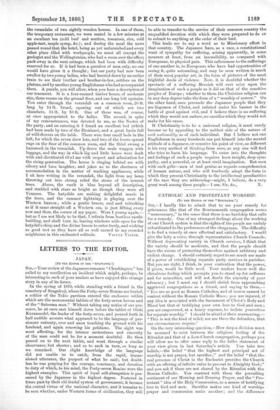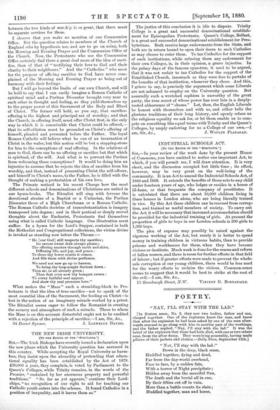CATHOLIC AND PROTESTANT WORSHIP. [To THE EDITOR OF TRH "
SPBCTATOR.")
hardly like to admit that to me your remedy for grievances like that of the Bournemouth congregation seems "unnecessary," in the sense that there is no hardship that calls for a remedy. One of my strongest feelings about the working of our Church system is that the rights of the people are unduly subordinated to the preferences of the clergyman. The difficulty is to find a remedy at once effectual and satisfactory. I would, give the laity a voice, through representative Church Councils. NVithont deprecating variety in Church services, I think that the variety should be moderate, and that the people should have the means of protecting themselves against arbitrary and violent change. I should certainly regret to see much use made of a power of establishing separate party services in parishes. But you are right, I think, in your contention that the power,, if given, would be little used. Your readers know well the chivalrous feeling which prompts you to stand up for sufferers and for minorities, and will not doubt the sincerity of your advocacy ; but I must say I should shrink from approaching aggrieved congregations as a friend, and saying to them,— " You are as good as Roman Catholics, and of course cannot be content without the Roman Catholic Mass; you are injured, if any idea is associated with the Sacrament of Christ's Body and_ Blood but that of testifying your own love to God and men ; you are empowered, at a heavy expense, to isolate yourselves. for separate worship." I should be afraid of their murmuring,— "This is not the kind of relief, nor are these the defenders, that. our circumstances require."
On the very interesting questiou,—How deep a division must be assumed to exist between the religious feeling of the Ritualist and that of a Low-Church congregation, perhaps you. will allow me to offer some reply to the fuller statement of your view given in last Saturday's article. You take two beliefs,—the belief "that the highest and principal act of worship is not prayer, but sacrifice ;" and the belief "that the real presence of Christ in the Eucharist provides the Church with an offering of infinite value to present to Almighty God ;" and you ask if these are not shared by the Ritualist with the Roman Catholic. You contrast with these the prevailing sentiment of our Morning and Evening Prayer, and the " Pro- testant " idea of the Holy Communion, as a means of testifying love to God and men. Sacrifice makes one kind of worship, prayer and communion make another ; and the difference between the two kinds of wor.Wp is so great, that there must be separate services for them.
I observe that you make no mention of our Communion Office. But the question relates to members of the Church of
England who by hypothesis use, and are to go on using, both the Morning and Evening Prayer and the Communion Office of the Church. Now, the Protestants who use the Communion Office certainly find there a great deal more of the idea of sacri- fice, than of that of "testifying their love to God and their charity to their neighbours." And the " Catholics " who meet for the purpose of offering sacrifice to God have never com- plained of the Morning and Evening Prayer as being out of harmony with their feelings.
But I will go beyond the limits of our own Church, and will be bold to say that I can easily imagine a Roman Catholic of spiritual mind and a Puritan Dissenter brought very near to each other in thought and feeling, as they yield themselves up to the proper power of this Sacrament of the Body and Blood of Christ. The former will hold, as you say, that sacrifice.
offering is the highest and principal act of worship ; and that the Church, in offering itself, must offer Christ first, in the only way in which it is conceivable that Christ could be offered,—
that its self-oblation must be grounded on Christ's offering of himself, pleaded and presented before the Father. The loyal Roman Catholic will believe what he can of an incarnation of Christ in the wafer, but this notion will be but a stepping-stone for him to the conceptions of real offering. In the relations of men to God, there can be no offering or sacrifice but that which is spiritual, of the will. And what is to prevent the Puritan from welcoming these conceptions ? It would be doing him an injustice to assume that he rejects the idea of sacrifice from his worship, and that, instead of presenting Christ the self-offerer, and, himself in Christ's name, to the Father, he is filled with the thought of making a protestation of his own love.
The Primate noticed in his recent Charge how the most different schools and denominations of Christians are united in our hymn-books. The Ritualist will sing with fervour the devotional strains of a Baptist or a Unitarian, the Puritan Dissenter those of a High Churchman or a Roman Catholic. The Roman Catholic doctrine of transubstantiation is imagery transposed into dogma ; and in their poetical or deeply moved thoughts about the Eucharist, Protestants find themselves using what is called Catholic language. One illustration must suffice. In a hymn for the Lord's Supper, contained in both the Methodist and Congregational collections, the victim divine is invoked as standing now before the Throne :—
"Ho [our God] still respects thy sacrifice ;
Its savour sweet doth always please ; The offering smokes through earth and skies, Diffusing life, and joy, and peace : To these thy lower courts it comes, And fills them with divine perfumes.
We need not now go up to heaven, To bring the long-sought Saviour down : Thou ar to all already given ; Thou dost even now thy banquet crown : TO every faithful soul appear, And show thy real presence here."
What makes the " Mass " such a stumbling-block to Pro- testants is that the idea of true sacrifice—not to speak of the most essential idea of the Sacrament, the feeding on Christ—is lost in the notion of an imaginary miracle worked by a priest. The Ritualist seems eager to follow the Romanist in creating the scenery and atmosphere of such a miracle. Those to whom the Mass is on this account distasteful ought not to be credited with a rejection of the principle of sacrifice.—I am, Sir, &c.,



































 Previous page
Previous page